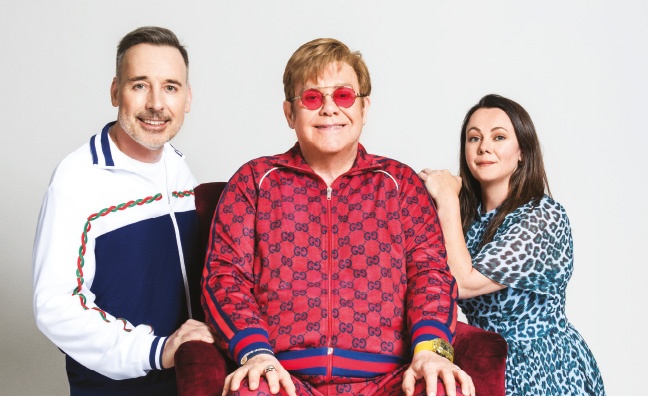When David Furnish became Elton John’s manager in 2015, the pair had no idea they were setting in motion one of the most groundbreaking stories of the modern music business. Together with Rachael Paley, who joined Rocket Entertainment soon afterwards, they have created a new golden era for an artist already enshrined in pop history. After the managers’ Music Week Awards win, we meet the trio to find out how they did it and look ahead to what happens next...
WORDS: NIALL DOHERTY PHOTOS: BEN GIBSON
Upon receiving their manager of the year honour at the 2022 Music Week Awards, the first thing that David Furnish and Rachael Paley did was to call Elton John. Sir Elton was on a rare night off from his Farewell Yellow Brick Road tour and Furnish, his husband, manager and Rocket Entertainment CEO, was of the mind that he needed to get some rest. They could talk about it in the morning. But Elton was adamant: he needed to know as soon as Furnish and Paley, marketing and promotions director at Rocket, had found out.
They acquiesced and as soon as they departed the stage, Furnish and Paley FaceTimed Elton to tell him the good news. Already tucked up in bed with his iPad waiting for the call (Elton doesn’t do phones), they were greeted by his face in close-up, answering from under the duvet.
“I was very relieved that they did win it because they were nominated last year and didn’t,” says Elton, over Zoom from his home in Windsor a few weeks later, Furnish at his side. “I was really happy for them because I don’t think any managers in the world have done for their artists what they’ve done for me over the last seven years. I’m a 75-year-old heritage musician with a great catalogue of songs and a great track record, but that doesn’t mean to say you stay relevant.”
“The award meant a lot,” adds Furnish. “Getting recognised by your peers is the ultimate compliment you could hope for.”
“I was blown away,” Paley chimes in. “It is amazing, because it’s a culmination of seven or eight years of really, really hard work.”
Furnish took over as Elton’s manager in 2015, sitting him down on holiday in Nice and saying, “You always say you want to die on stage, but now we have two children. If we don’t get you off the road, you’re never going to be around to see your kids grow up. Let’s make a five-year plan and see what we can do.”
Elton agreed wholeheartedly that there was something in the idea.
“I said, ‘Fine, I don’t want to spend the rest of my life on stage,’” he recalls today. “It’s so great to have someone who comes along with great ideas day after day and you see the result of it.”
The Music Week Award is confirmation of just how stratospherically well their five-year plan has paid off. And just how much thought went into it.
“You can’t turn a supertanker like Elton John on a dime,” says Furnish. “You need a good long-term plan in place that lays the foundations.”
The mission statement that has guided Furnish, Paley and Rocket’s senior team (completed by COO Luke Lloyd Davies, CFO Mike Dawson, tour director Keith Bradley and general counsel Elanzo Burgess) through the past seven years has been to “elevate and celebrate” Elton’s legacy and introduce his music to a new generation of fans.
They’ve done it in a variety of ways, all of them wildly successful: a raft of expertly crafted reissues, greatest hits sets and reworkings, revamped social media profiles and curated playlists on DSPs. Then there was the Rocketman biopic grossing nearly $200 million, the best-selling autobiography Me, his Rocket Hour show on Apple Music and also The Lockdown Sessions record that saw Elton collaborate with a wave of artists from Dua Lipa and Rina Sawayama to Years & Years and Lil Nas X. To cap it all, there’s the sprawling Farewell Yellow Brick Road tour which took in BST Hyde Park and a string of UK stadiums in June and July. It will conclude its outdoor run in LA in November before a Covid-postponed visit to UK and European arenas in 2023. To see it all written down, it’s a lot.
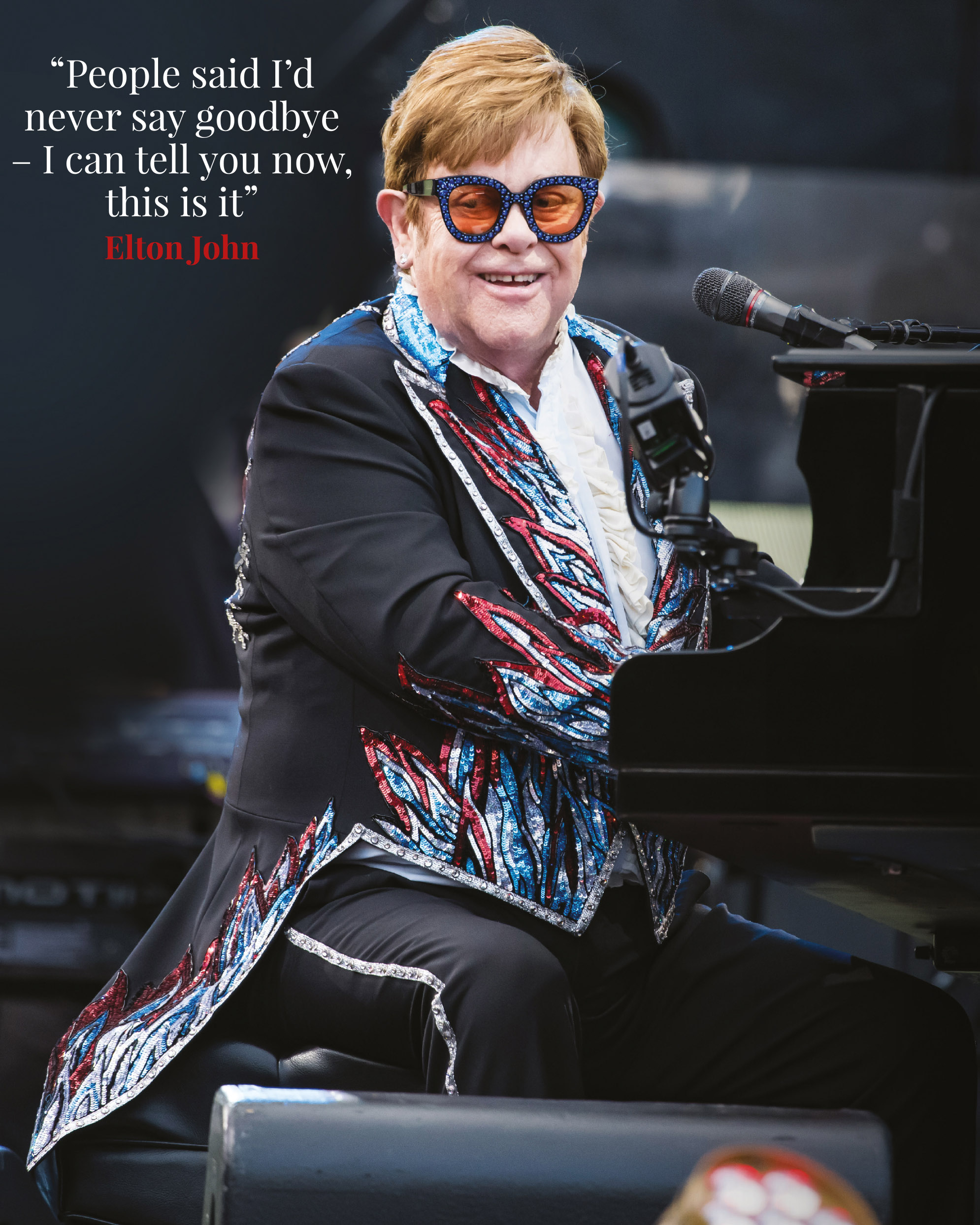
The numbers are similarly astounding. Greatest Hits LP Diamonds set the ball rolling at the tail-end of 2017, becoming his 40th UK Top 40 album.
“It felt like a breakthrough because then we had the John Lewis Christmas ad the next year,” says Paley. “There were various touchpoints that kept bringing it together.”
Diamonds’ current sales tally stands at 970,063 according to the Official Charts Company. Of that total, 640,077 derive from streams, offering proof of how Elton has distinguished himself from his peers. The Lockdown Sessions (126,127 sales) delivered an eighth UK No.1 in October 2021 and spawned the No.1 hit Cold Heart, a banger that sampled four previous Elton classics created with Australian dance act Pnau and Dua Lipa. Its success saw Elton become the first ever solo artist to score a UK Top 10 hit single in six consecutive decades.
Hitting the top spot was “astonishing”, Elton marvels. It was a slow start, though.
“It took five weeks to hit the Top 40,” he says.
“There was a bit of resistance,” offers Furnish. “I think people thought, ‘Oh, it’s Elton John who’s 74, it’s just a remix.’ But it’s not, it’s a new way of making a record.”
“I think we knocked Ed Sheeran off No.1!” laughs Elton. “He kept phoning me up saying, ‘You’re gonna do it, you’re gonna do it!’”
Elton gushes about working with Dua Lipa on the track, which has racked up a cool 1,374,005 UK sales and 980,828,886 plays on Spotify, where it is by some distance his biggest song.
“She’s so professional, so charming and right on the money,” he says. “It was easy peasy. She’s got everything there is to have as a female artist. She’s bright, modest and not carried away by her own success. I loved working with her.”
Cold Heart was followed by more singles glory (“I had three No.1s in England last year, I mean, that’s incredible!” beams Elton) as Ed Sheeran collaboration Merry Christmas (337,976 sales) and LadBaby’s charity version Sausage Rolls For Everyone (167,077 sales) both hit No.1.
Such numbers only add to a long list: Elton has sold more than 300 million records worldwide and boasts the biggest-selling single since chart records began with 1997’s Candle In The Wind, which sold more than 33m copies. Now, though, with Furnish and Paley running the show, the success feels even sweeter.
“It’s astounding and it really is a partnership,” says Elton. “We work together. I trust David. I don’t think I’ve ever said no to anything he’s suggested because it’s always been common sense.”
Paley paints a similar picture of the bond the trio share.
“I see David as the true north of everything,” she offers. “So any time I go to him and say, ‘I don’t know what we should do on this,’ he has this ability to cut through absolutely everything. He’s the best person to be managing Elton because he knows Elton’s DNA better than anyone else.”
Two years spent at home with his family during Covid confirmed to Elton that bringing an end to an illustrious career as a touring artist is the right thing to do.
“What David has done is keep me revitalised,” he says. “He’s capitalised on the fact that I still love music as much as I did when I was in Bluesology all those many years ago, and that’s an incredible testament for an artist. Usually artists peter out. I didn’t want that. I wanted to go out in a blaze of glory and he’s done that for me.”
Furnish says that one of the keys to executing their plan was Elton’s openness to trying new things. It’s one of the reasons why he was happy to take over managing him.
“Once he understands the role it plays in his world, he’s happy to give it a try,” says Furnish. “He doesn’t micromanage. You have to make Elton aware of the concept, then he buys into it and lets you get on with building it and he doesn’t lean over your shoulder. He trusts the process and trusts the collaborators. But then you better get it right. There is that expectation at the end – if it doesn’t turn out the way it should, he’s not happy.”
When Furnish took over management duties, they knew there was untapped potential.
“I’m not going to say anything bad about my old management but we had to weed out the old and start again,” says Elton. “The old management and people that we worked with were stuck in the past, they hadn’t embraced the future and dealing with the record company was like, ‘Just give us more money, will you?’ That’s not the way it should work.”
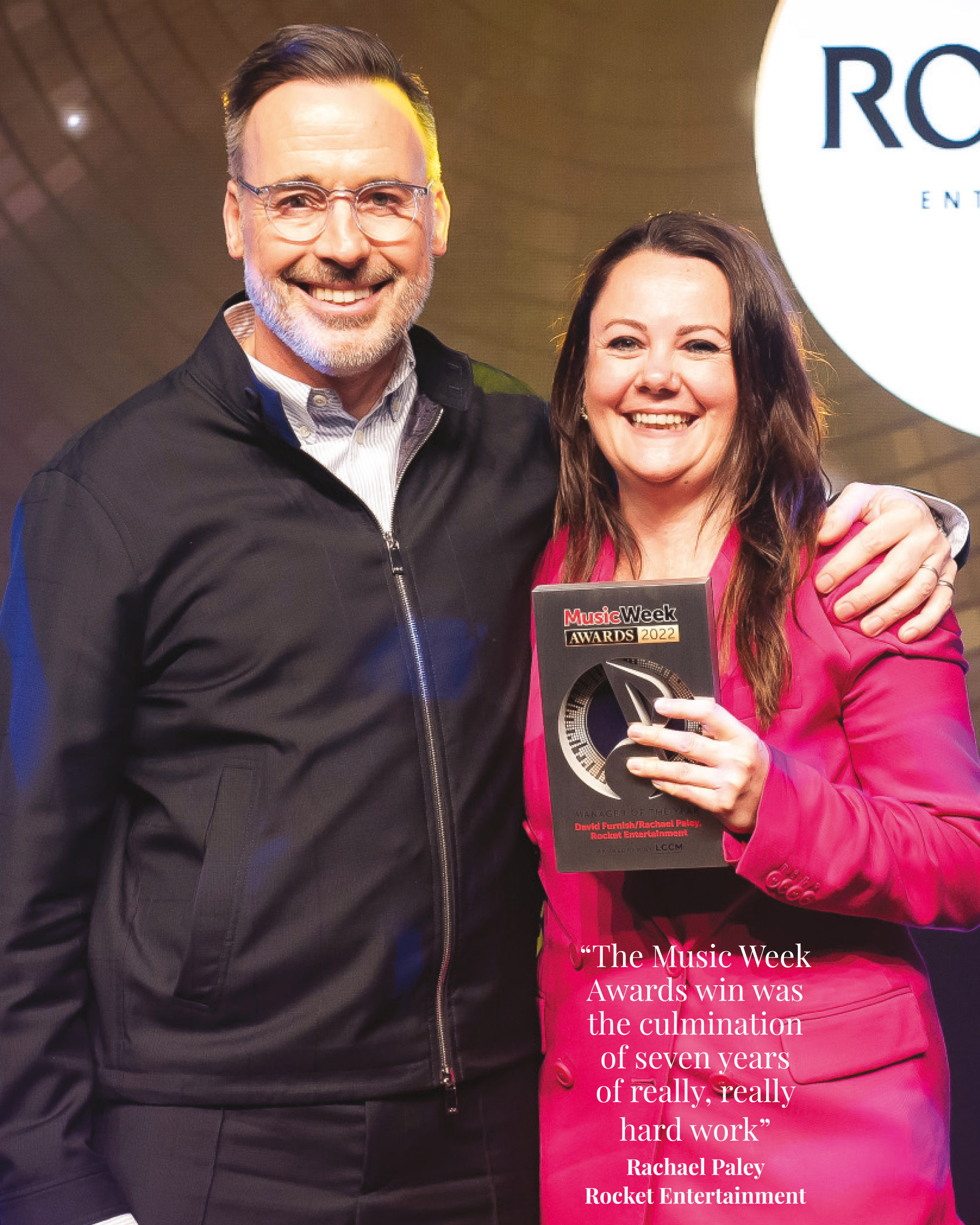
Some of the people Elton parted ways with told him it would all be over in six months, that having Furnish as manager was destined to end in disaster.
“But it went from strength to strength because David thinks outside the box,” praises Elton. “A lot of managers are men in suits, but David is creative in his own right. He’s not just sitting there planning the big career, he’s involved in every aspect because he loves it, and that’s a really big difference. Most managers sit there and they’re just managers. He’s got a great eye and a great ear, and that makes for a double whammy.”
Elton highlights the importance of the foundations Furnish laid back in 2015.
“He faced incredible anger and jealousy, he had to fight his corner and he built it from the ground up,” he explains. “We hired people like [music industry veteran]Tony King, who I’ve worked with for years and who’s got the best taste and the best eye, we brought in Rachael, we built a great team of people with young ideas.”
The relationship with his label, too, has been wonderful, says Elton, particularly with Universal Music Group chairman & CEO Sir Lucian Grainge, Universal Music Publishing Group chairman & CEO Jody Gerson and Universal Music UK CEO & chairman David Joseph.
“They’ve never had a five-year plan presented to them, for any artist,” says Elton. “So they were able to get behind it.”
“We got all the key people from the label on board and said, ‘This is our vision’” adds Furnish.
In 2018, Elton signed a deal that means UMG’s global labels will “release all of Elton John’s new music for the rest of his career going forward.” His publishing, merchandise, brand management and licensing rights, plus five decades of catalogue, were also covered by the agreement. Elton often speaks to the key figures at his label, he says, but not to discuss business.
“All I want to talk to the record company about is music,” he says. “I don’t want to talk about royalties – that’s David’s job. I talk to David Joseph or Lucian or [EVP at UMG] Michele Anthony or Jody or [Universal Music Enterprises president/CEO] Bruce Resnikoff about what I’m listening to and what’s great. As the musician and the writer, that’s all I want to do. I don’t want to get involved in the day-to-day stuff.”
Rachael Paley has become the team’s key conduit in dealing with the label. Furnish’s background is in advertising – he was an executive at Ogilvy & Mather – so while he understood brand building and consistency alongside marketing and positioning (he was bewildered, for instance, that there wasn’t an Elton John logo), he looked to Paley when it came to understanding the inner-workings of a major label. Paley was previously Elton’s marketing guru at Universal before the move to Rocket and was perfectly placed to oversee progress, still going into Universal for a full day every week.
“She’s impossible to ignore!” laughs Furnish. “The fact that she’s in the building and talking to them means you’re always keeping your artist top of mind.”
Paley is incredibly passionate about the work being done with Elton’s illustrious past.
“I’ve always felt the approach to catalogue shouldn’t just be box sets,” she explains. “It should be about, ‘You’ve got a catalogue there that people aren’t aware of.’ It’s about joining the dots, giving a little bit of narrative or background on the track in the description, so you’re exploring the music and falling down a rabbit hole.
“The housekeeping was really important from the start, from DSPs updating the bios to putting thumbnails on all the content,” she continues. “It really was the nuts and bolts of things. I was at the label before, so it’s a joy going in. Obviously, I’m on the other side of the fence now so sometimes you have to crack the whip a bit.”
The strategy was to open up easy routes for people wishing to discover Elton’s music, reveals Paley.
“When Rocketman played on Channel 4 in June, we had a Pride playlist [ready],” she says. “It’s making sure that when people are wanting to find out more, there are no barriers to entry.”
Furnish sees the Rocketman movie – which starred Taron Egerton – as “super-important” in introducing Elton’s music to a new audience.
“I think a lot of younger fans know his music, but they didn’t have the understanding of the things Elton has had to overcome in his life, issues of self-love, family, acceptance, addiction, sexuality and sexual identity,” he says. “Those are all things young people grapple with today and I think they connect with that.”
“I think it did open the doors to the exploration of Elton’s catalogue,” agrees Paley. “Although our focus was the soundtrack at the time, we found that Diamonds then started to go up again. The fact that it’s been in the Top 100 for the last five years is testament to that.”
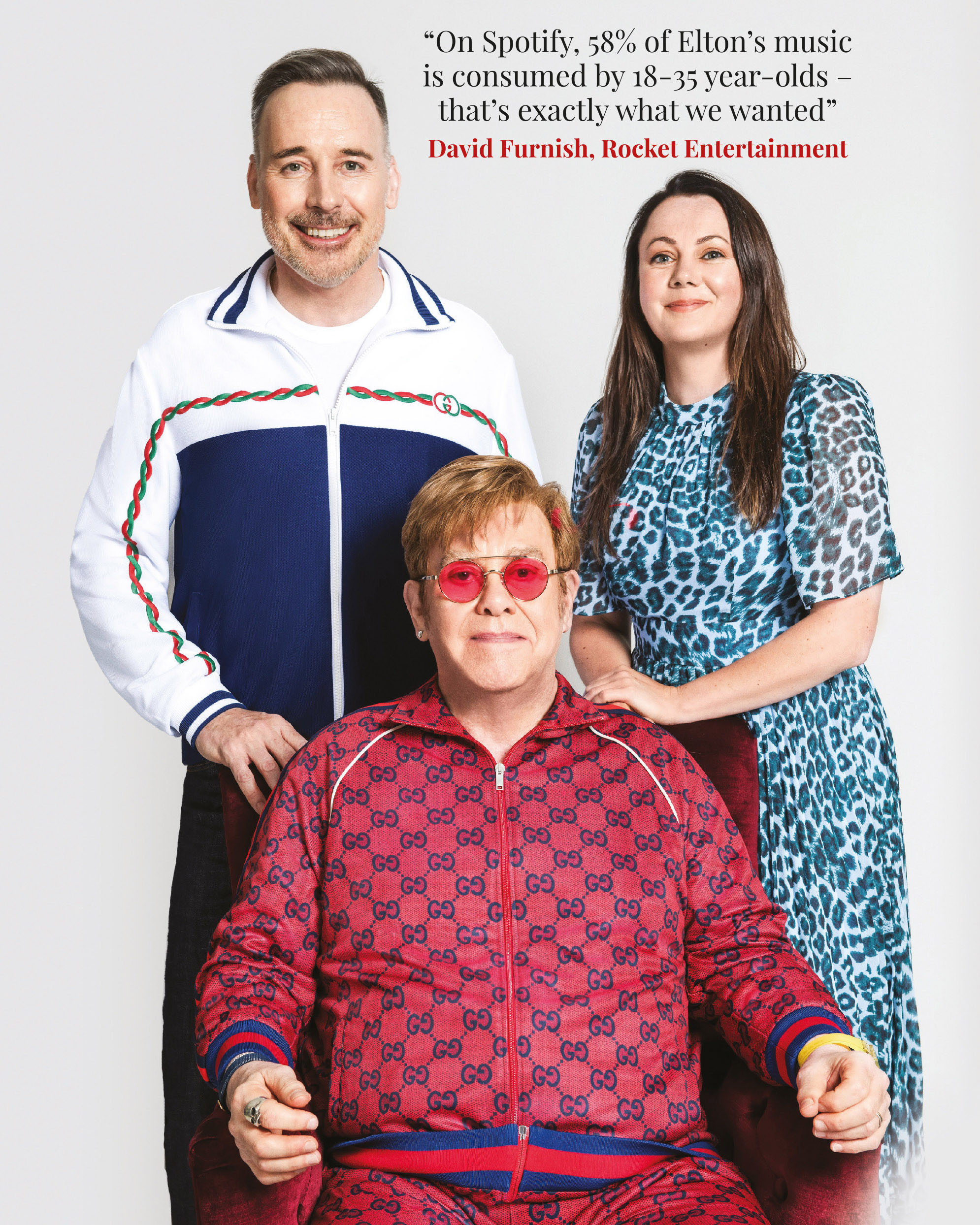
By the time the Farewell Yellow Brick Road tour was announced in New York in 2018, Elton could feel the wind in his sails.
“The tickets went on sale and they went far better than I could have ever imagined,” he says. “You could feel the momentum. Momentum is everything. I had it in my early career and once you’ve got it, you don’t let it go because it’s a bit of a tsunami.”
He was criticised, he says, for the Farewell Tour because people said, “Oh, he’ll never say goodbye”. But they’re wrong.
“I can tell you now that this is it,” he asserts. “I will not be devoid of music but as far as schlepping around the world doing shows, I don’t want to do it anymore. I’ve done it since I was 17.”
All the while, Furnish was keeping an eye on streaming figures, watching the monthly listeners grow and seeing the demographic starting to shift.
“It’s hard to get all the data you want from the streaming companies,” says Furnish, “but Spotify in particular, 58% of Elton’s music is now consumed by 18-35 year-olds. That is absolutely what we wanted and what we hoped for. It’s why Elton always said he appreciated the opportunity with The Lion King, it’s why we did something like Gnomeo And Juliet 10 years ago, to keep the songs in his catalogue alive and introduce them to a new generation.”
By the end of 2021, Elton had 66m monthly listeners on Spotify, a 100% increase year-on-year.
Elton doesn’t need the stats, though, he can see it in the audience right in front of him. At a recent show in Liverpool, he noticed a boy of about 11 donning sparkling glasses and singing along to every word in every song.
“Including the ones that were obscure!” says Elton. “I had him up on stage for the encore and gave him a pair of my own glasses. If you’re a songwriter, you want your songs to be appreciated by everyone, not just by a certain class or age of person.”
Another important strand in introducing newbies to Elton has been extra-curricular activities. This includes film cameos (he played himself in the spy-comedy sequel Kingsman: The Golden Circle) and TV ad appearances, like the hangry-themed Snickers ad, or the Uber Eats campaign where he asked Lil Nas X for money while on a toy rocket.
“One of the things people love about Elton is he takes his art and his craft very seriously but he never takes himself seriously,” says Furnish. “Something like Kingsman reaches a big, broad and younger audience, has Elton catalogue in the film, but also gives Elton a chance to send himself up.”
Music remains a significant subject for Elton, and not just his own. He goes above and beyond in supporting new artists he loves, either through his Apple Music show or with a more personal approach. He even handpicked Rina Sawayama, Berwyn and more as support for his BST Hyde Park gig.
“New music is a surprise,” he says. “It’s so great to see Nova Twins, Wet Leg, Let’s Eat Grandma, The Linda Lindas, Haim and all these girls rocking out and making the best music. Apart from Sam Fender, none of the boys are doing it, the girls are. It’s a breath of fresh air, because it comes from innocence and pure joy and that, for me, is what music is about.”
His biggest fear for emerging artists is that there are genuine greats who might be passed over.
“Unfortunately it’s happened all through the history of music,” he says. “It’s a crapshoot, down to happenstance and luck. I went through the second album process with Sam Fender. He came down here [to see me] and was worried, then he finally cracked it and I lived through that and to see him soaring now, you’re just like, ‘Yes, yes, yes!’ I did that with Brandon Flowers too.”
He has also offered recent reassurance to Lewis Capaldi.
“He’s made a second album and he’s got apprehensions about it, which is absolutely normal,” Elton says. “He came down to play me some tracks and it’s a no-brainer.”
For Elton, the buzz of the new keeps him alive, it always has.
“Whenever I see something that really affects me, I get hold of those people on the phone and say, ‘Listen, you don’t know me, but I thought that was brilliant, well done,’” he says. “I know Paul Weller does it and McCartney keeps his ear to the ground, but I just go a little step further. I make sure I telephone or FaceTime them, and then they become friends.”
It all stems back to his heroes doing it for him.
“It meant the world that George Harrison was getting in touch, or that The Band came to see me, that Leon Russell took me on tour, that Linda Ronstadt was at my concert,” he says. “It’s nice to be able to give people that confidence.”
Furnish remembers the days when Elton would fill the six CD changer in his car with new releases, recalling his excitement about a certain Lady Gaga before she broke big.
“As long as I’ve known you, you’ve always listened to new music,” says Furnish, turning to Elton. “You’ve always had that generosity of spirit and inquisitiveness about your craft and you put it into action, which so many people don’t. I think you’re very unique in that regard.”
As well as offering advice, Elton has also been returning to his session-player roots, something prompted by his approach to The Lockdown Sessions. A few weeks ago, he was in the studio with Glass Animals’ Dave Bayley, and on the morning we speak, Yard Act release a new version of their track 100% Endurance featuring Elton.
“I love them,” he smiles. “I’ve become very close with James [Smith, frontman] and I love what they do.”
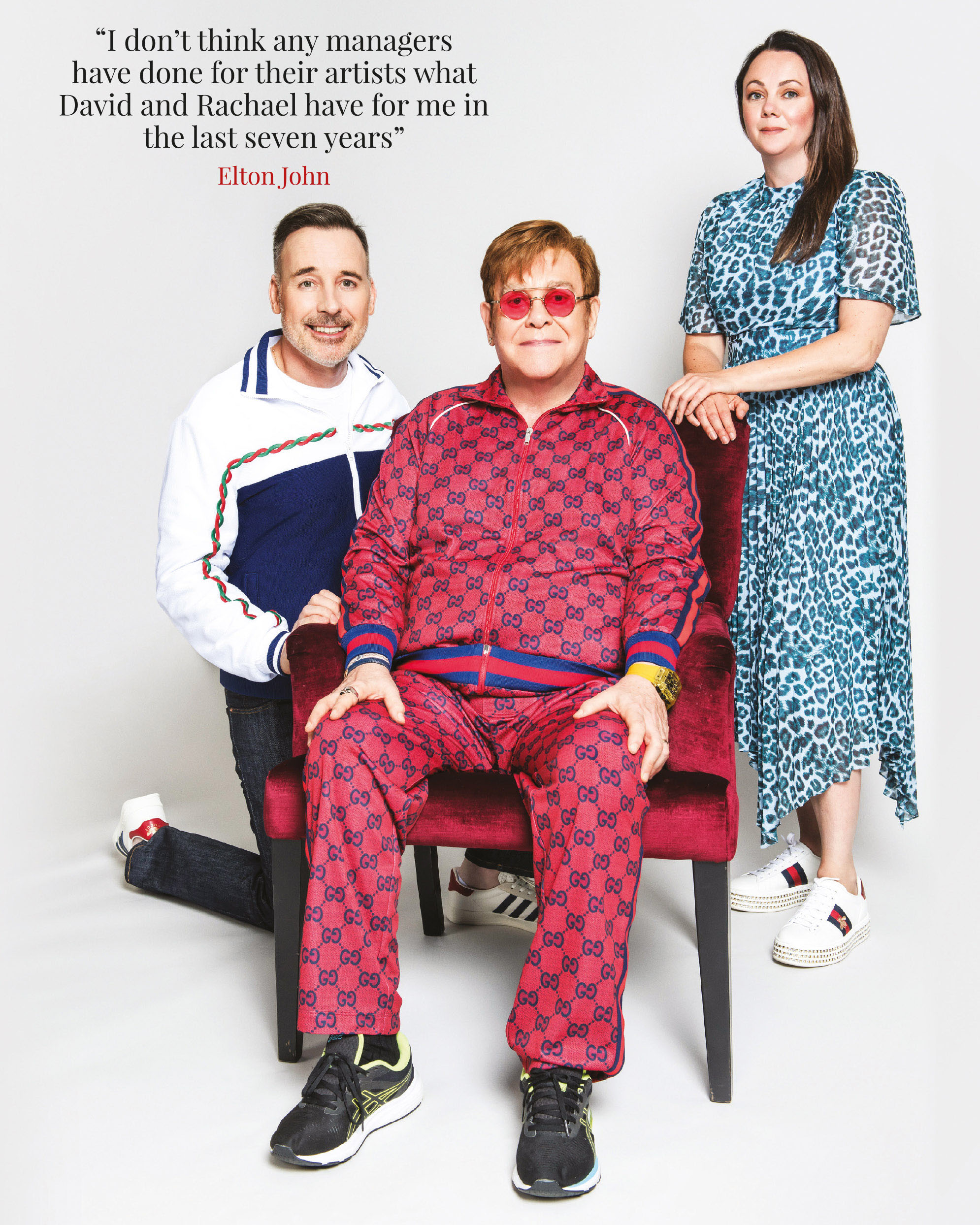
He is rather less effusive about the current state of the charts, however.
“It’s lovely to see Kate Bush at No.1, but there’s not many good records in the Top 20,” he says. “And the albums chart is full of things like me, ABBA and Queen. The odd thing comes through, like Sam Fender or Harry Styles, or you get a new artist coming in at No.3 and then disappearing to 80-something. It’s depressing – there are a lot of good albums that deserve to be in the albums chart, like Juanita Euka, Sharon Van Etten, Angel Olsen. What I want to know is why aren’t they there? Because of people like me!”
Away from the charts, Elton and Furnish became leading voices in the protest against what the Brexit trade deal meant for musicians, warning of the “looming catastrophe” in a statement during a DCMS Committee hearing. While highlighting that there’s still much to be done, they feel positive steps are being taken.
“There’s a lot of red tape,” ponders Furnish. “The trucking situation has got better, but artists still have to apply for individual permits which is time consuming and costly.”
“It is getting a bit better,” adds Elton. “There are a lot of British acts playing Primavera and Polish and German festivals. You can’t put chains around an artist. The greatest thing to improve your writing and skill is to play in a country that doesn’t know who the fuck you are, because it’s scary, it’s fabulous and it gives you adrenaline. To cut that source off from a young artist, no matter if they’re an actor or singer or orchestra member is terrible. But it is getting better.”
Elton isn’t sure if there’s any way in which the industry is better now compared to when he first emerged in the late 1960s. It was a different world back then.
“There was the advent of FM radio in America,” he says. “It revolutionised the way music was heard there. Tumbleweed Connection was my third album. It didn’t have a single on it but it got a lot of play on FM radio.”
“Don’t you think that there are fewer barriers to entry?” Furnish asks him. “Like, if you make a record now, you can just put it up online, [whereas] before you had to press vinyl.”
Elton considers it, but he’s not so sure.
“A record now can hang around on the radio for a year, like Cold Heart for example,” he says. “In the old days, when you went into the charts, the record was gone in a week, so I made two albums a year, so did the Stones and The Beatles in the ’60s. It made me much more adventurous and creative. There was no social media. I’m not a big social media fan. I don’t have a phone so how can I be?”
“He has an iPad,” says Furnish, “basically a big phone.”
“But I don’t know how to download!” adds Elton.
“He streams,” clarifies Furnish. “He just doesn’t know he’s streaming.”
The five-year plan has yielded huge results, but Elton, Furnish and Paley are just as excited about the next phase. Most significantly, there’s a forthcoming Disney+ documentary titled Goodbye Yellow Brick Road. It will delve into Elton’s rise to fame with unseen footage and will document his return to Dodger Stadium in LA this autumn.
“Disney+ has 138 million subscribers, it gives you an opportunity to reach a wide audience and mark an important milestone for Elton and the industry,” says Furnish. “I don’t think there’ll ever be another Elton John. The closing of the narrative will be Elton walking off stage and saying farewell to touring in North America.”
“I’m really excited about the outdoor shows,” adds Elton. “I’ve never done a tour of outside shows like I’m doing.”
Furnish is also looking into opportunities to expand the Elton brand in the metaverse.
“That’s going to be a big new market for music discovery,” he says. “We’re looking at it closely but carefully. Elton’s been a bit like an avatar his entire life, throwing things on and off, changing and moving forward.”
Paley adds that whatever they do will always be true to Elton.
“When I’m representing him in a room, I want to be true to who he is and make sure that we’re doing everything that he would be comfortable doing,” she says.
Away from music, there’s a book about Elton’s relationship with Graham Taylor when he was chairman of Watford FC. There are also new exhibitions planned for the Sir Elton John and David Furnish Gallery at the Victoria & Albert Museum.
“You never know what’s coming,” Elton says. “One phone call can change your life. Tim Rice called me and said, ‘Disney asked who I wanted to do The Lion King with and I said, ‘I want to do it with Elton John’ – they replied, ‘You’ll never get him.’ He phoned me and I said, ‘I’ll do it in a heartbeat.’ That call changed the whole of my career in a way.”
The best thing about life, Elton says, is that you never know what brilliance is round the corner.
“That’s why Billie Eilish was a breath of fresh air because there was no one ever like her,” he concludes. “She’s 20, made three albums and she’s blossomed as a performer. Those kind of people refresh everything. That’s what makes everything in the music business so special. The most exciting thing is the unknown.”
